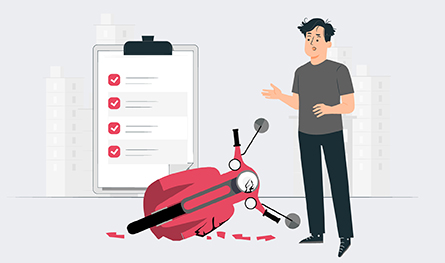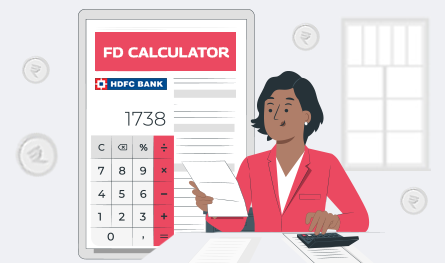Bike Skid – 4 Common Causes of Bike Skidding and Tips To Control It

Bike skidding can be caused when one or more tires of your bike lose grip on the road. The reasons can be many but the fatality it causes is dangerous. It is very important to avoid such skidding-related accidents to ensure the safety of riders and the pillion. Read this post to learn the causes of bike skidding and the tips that one must take to avoid skidding.

Bike Skidding Reasons – Know What is the Common Cause of Skidding
Though skidding is a natural thing that occurs with most two-wheelers even if you are riding the vehicle at the minimum speed. If you can’t control your bike while riding, there is a good chance that your bike might skid.
In this blog, we are discussing reasons why a bike might skid and also offer tips on controlling your two-wheeler in nerve-racking situations.
Also Read: Fastest Bike in India
4 Common Causes for Bike Skidding on Road
As such the roads in India are mostly uneven and bumpy with many potholes in them, which might cause bike skid accidents. Moreover, with the rising number of two-wheelers, there has been a lot of traffic on the roads all the time which led to accidents. Below are some of the bike skidding reasons that might cause your two wheeler to skid:
- Taking a sudden turn or changing your direction suddenly – Yes, if you change your direction suddenly while riding your bike, it is likely that your bike might skid. While riding a bike, the rider might require to take sudden turns to avoid collision or something, which obviously enhances the possibility of skidding on bike.
- Using Brakes Unnecessary – In India the traffic rules are not followed properly by most people, which causes hassles in driving. For instance, you might keep riding your bike in the right direction properly but suddenly a bike or a pedestrian from the opposite direction might cause you to use brakes. And during such situations, when you use the brake too hard it may result in tires of the bike getting locked, which might cause skidding.
- Leaning your bike too much – While riding your bike, if you have to take a turn and if you lean your vehicle towards one side, there is a possibility that your bike might get tilted to a certain extent, which might lead to skidding of your bike. This is because if the rider leans more towards one side of the bike to take the turn, he/she might lose balance and the bike might skid.
- If the roads are wet – Skidding is also likely if the road where you are riding your bike is wet. And due to rain and many other reasons, most Indian roads remain wet most of the time. Thus it enhances the chances of your bike getting skidded if you ride on a wet road and have to apply brakes.
Also Read: Motor vehicle insurance online
3 Simple Tips to Control Bike from Skidding
If while riding a bike, the rider experiences skidding, he/she is most likely to get scared. And it will also put the rider in an anxious situation and during such situations controlling your bike becomes hard. Thus, sometimes the rider starts panicking. So, what to do during such situations?
Below are some tips that can help a rider to gain control on his/her bike if it skids:
First and foremost, Do Not Panic
- Shift Weight – the weight of the rider is the main factor that affects the tilt of a vehicle. Normally the two-wheeler owner controls the tilt of the vehicle by using his/her weight. So, if you put greater weight on your bike’s rear wheel, it balances your bike and reduces your skid.
- Do Not Use Clutch – Downshift the gear and try to avoid using the clutch as much as possible. Though engine brakes are used to lower the speed of the vehicle, not using the clutch is better as it might prevent skidding.
- Do not take sharp turns while the roads are wet – While taking a sharp turn, the rider is required to tilt to a degree. This tilt causes skidding in many cases, especially if you are riding on a wet road. This is because you tend to lose grip in such a case. So, avoid sharp turns as much as possible while riding on a wet road.
Also Read: Trending Bikes in India

Author Bio
Paybima Team
Paybima is an Indian insurance aggregator on a mission to make insurance simple for people. Paybima is the Digital arm of the already established and trusted Mahindra Insurance Brokers Ltd., a reputed name in the insurance broking industry with 17 years of experience. Paybima promises you the easy-to-access online platform to buy insurance policies, and also extend their unrelented assistance with all your policy related queries and services.
Other Motor Insurance Products
Latest Post
So, you’ve crossed the fabulous 60 mark. Retirement may be on the cards, your kids might be off doing their own thing, and suddenly your knees are making more noise than your WhatsApp notifications. Welcome to the senior citizen club.
Now let’s talk about something most of us tend to postpone until a doctor gives us a reality check: health insurance. If you are wondering whether buying health insurance after 60 makes sense, the answer is a loud and clear yes. This article will cover everything you need to know about it, how it makes sense, how it differs from health insurance for young adults, and what you need to look out for when checking for medical insurance above the age of 60.

.png)
April 2 is observed as World Autism Awareness Day and there is no better way to observe the day than to raise awareness of this condition and to promote kindness towards autistic people. Read on to know more.


Car depreciation implies the difference between the cost of a car at the time of buying the car and when you sell it. A car insurance claim amount is determined by the car depreciation rate. The car depreciation rate is the reduction in the value of your car over its lifespan caused by wear and tear.


Fixed Deposits (FDs) are one of the safest ways to grow your savings. HDFC Bank offers attractive FD interest rates, allowing you to earn guaranteed returns on your investment. But before you invest, it's important to know how much interest you will earn and what your final maturity amount will be.


If you think of life insurance, chances are you are picturing something people buy in their 30s or 40s. But what if you are 65 or older and just getting started? The good news is that you are never too late. Whether you are thinking of easing the financial burden on your family, covering final expenses, or simply leaving behind a legacy, there are life insurance options tailored just for you.
This article will be a guide to life insurance for senior citizens above 65 years, explaining why it is important, the type of insurance options, and how to get the right policy for you.




